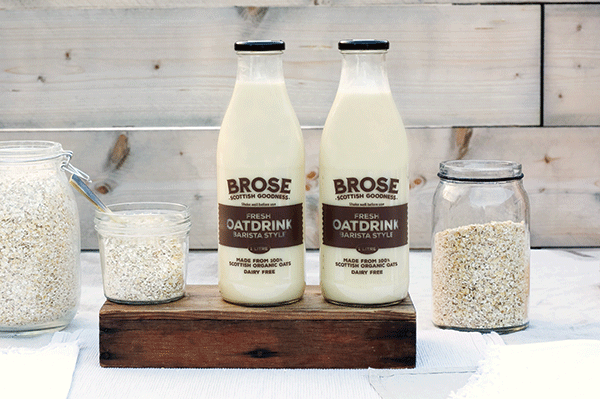Think of Scottish food and drink and what springs to mind? Whisky and salmon, for sure, but how about oats?
This is a nation brought up on porridge (and Irn-Bru), and able to produce some of the finest oats in the world. But Scotland has, until recently, let the oat milk party pass it by. “It’s ridiculous the amount of oat milk that people drink [so] why aren’t we making it?” wonders Josh Barton from Brose Oat Drinks.
In 2019, the UK oat milk market was worth £74 million in retail sales alone – up from £36m the year before, according to Mintel. Sales are “on fire”, suggests Kai-Brit Bechtold, senior consumer research scientist at ProVeg International. Cow’s milk generated sales of £3.1bn in the same year, but they’re falling, in part thanks to interest in dairy-free alternatives boasting of their environmental benefits.
Brose, which was started by Barton and farmers Tommy and Robbie Dale, is among a number of very small brands looking to jump on the plant-based bandwagon. In recent months, SAC Consulting, part of Scotland’s Rural College, has reported a glut of enquiries from farmers and businesses interested in developing their own Scottish oat milk. Many had seen the success of other brands – most notably Oatly.
The company, started in Sweden, has become synonymous with oat milk, and arrived on the US stock market in May with a bang. The near £10bn valuation means there’s a reported £1bn to spend on expanding production capacity. Its first UK factory is due to open in 2023, and there will plenty of cash to splash on innovation, too.
How on earth can these Scottish start-ups compete with that? “Oatly’s a great product but I think we’ll catch up,” says Barton on a Zoom call from East Lothian, where the company is based.
That’s certainly ambitious for a brand currently in “soft launch” mode and waiting for an electric van to arrive to help with distribution of its fresh ‘milk’. “It’s a long road,” says Barton. “We are establishing our name and place in the market.”
He isn’t alone. SAC recently announced plans for an Association of Independent Oat Milk Producers in Scotland. The idea is to help all these micro-businesses deal with everything from legal expertise to marketing and research. Oatly puts carbon footprints on its products, but might Scottish products have a smaller one?

“The industry in Scotland is in its infancy and must compete with large international brands like Alpro and Oatly,” explains SAC’s Alistair Trail. “By collaborating, the individual niche manufacturers will be able to share resources and help the fledgling industry compete.”
Scale is key. Brose is looking at bigger tanks and new kit as it plans further expansion, but it’s expensive.
The process isn’t quite as simple as some might assume, either. “I think there’s a sweet spot and until you get to that point you’re spending money just to operate,” he says.
That’s the position Untitled Oats, in Edinburgh, found itself in. After six months and 50,000 litres, the company recently stopped trading. Alex Baldwin, co-founder, had hoped to attract investment and in a few years become a competitor to Oatly. Sadly, it didn’t turn out that way, but the chemical engineering graduate’s passion for the Scottish oat milk sector remains undimmed: he is heavily involved in driving the new association.
The association will have plenty to do, such as the fact the few plants in the UK which can process oat milk tend to have minimum runs of 10,000 litres – well above what these micro-brands are producing. Pooling the milks isn’t really an option either: the drinks can be wildly different. Indeed, tasting Brose for the first time I was taken aback by how sweet it was.
Their barista version (an essential product in any oat milk range these days) has a more neutral flavour. Brose uses organic oats but has tested non-organic and says they actually work better for the barista product – which is “a bit controversial”, according to Barton.
Brose, which opened for business in October, currently delivers directly to customers across Scotland, plus some cafes and zero waste shops in Edinburgh. But the company isn’t chasing sales and is more worried currently about simply meeting demand. “We want to get to the point where we can produce 1,000 litres a day,” says Barton.
Should Oatly be worried? Not yet, unsurprisingly, as it sold almost 19m units in 2018. But it’s already flexing its financial muscle to squeeze out the competition. At the time of writing, the brand is suing Glebe Farm in Cambridgeshire, claiming that its PureOaty oat milk product is too similar, and packaging adopts the irregular lettering used by Oatly, according to trial documents. The move “surprised” Glebe Farm owner Philip Rayner.
As he wrote in a statement: “[…] there are deeper principles at play here for us as a family farming business in wanting to challenge back.”
Glebe is the only large-scale manufacturer of oat milk in the UK (others use contract manufacturers, or are hyper local start-ups), so would be Oatly’s closest competitor. Oatly’s new UK production facility is estimated to be likely to take 90,000 tonnes of oats a year, which represents around 10 per cent of UK supply – so shortages and price rises are a possibility.
But provenance is a strong selling point for these Scottish brands. The Brose website traces the emergence of oat drinks back to the 1500s, when they were known locally as ‘brose’, and served cold out in the fields during harvest season. “This market is hotting up,” concludes Baldwin, and looking at the history of this traditional product, that’s in more ways than one.
This article was originally published in the Wicked Leeks summer 2021 issue. You can read the full magazine for free on Issuu here.









0 Comments